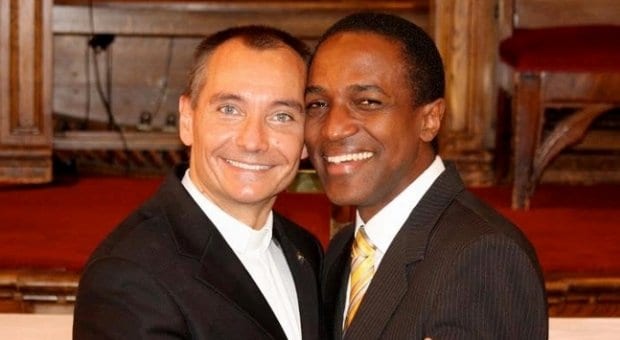
International grand marshal Maurice Tomlinson (right) and his husband, Reverend Tom Decker. Credit: Courtesy of Maurice Tomlinson
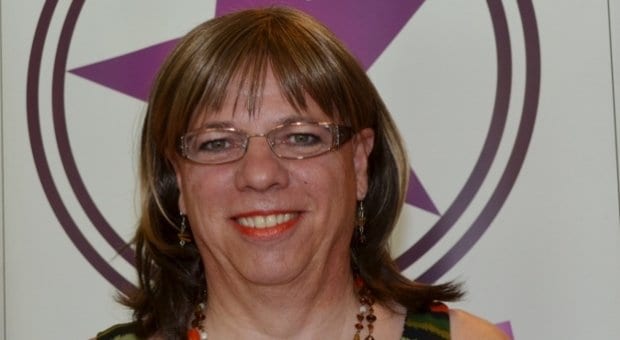
Lifetime achievement marshal Amanda Ryan. Credit: Bradley Turcotte
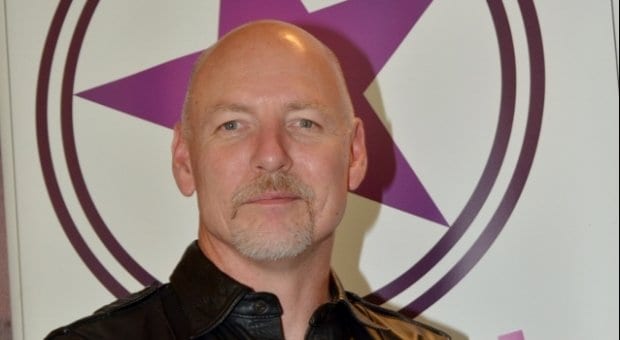
Community marshal Michael Tattersall. Credit: Bradley Turcotte
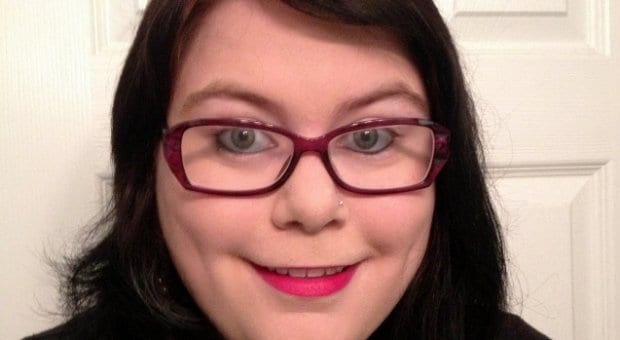
Youth marshal Erica Butler. Credit: Heather White
To better honour and reflect Ottawa’s vibrant and multifaceted queer community, Capital Pride (CP) will honour not one but five marshals at this year’s parade.
The quintet will travel to and from each flag-raising on Aug 19 in a pink limousine and lead the Pride parade on Aug 25.
Maurice Tomlinson says he was shocked to be named CP’s international grand marshal as he “didn’t think that my work was recognized in Ottawa.”
A lawyer by day, Tomlinson has fought for gay rights in his homophobic homeland for more than a decade, trying, among other things, to repeal Jamaica’s “anti-buggery” law.
The lead attorney in a case to challenge the anti-sodomy law, Tomlinson hopes the courts will realize the new Jamaican constitution, passed in 2011, makes the law unconstitutional.
“The new constitution seems to give a way for us to declare it unconstitutional so we are using the courts to get it expunged,” he says. “We do not think the new politicians have the testicular fortitude to actually expunge it.”
There is some recognition in the Jamaican government that they need to do more for gay rights, Tomlinson says. The July 22 murder of 17-year-old Dwayne Jones, who was dancing with a man while dressed as a woman, prompted the minister of justice to condemn the savage attack.
“There is a recognition that they need to do more. The challenge is that there needs to be a sustained, aggressive program of tolerance and inclusion led by our leaders, and that’s not happening,” Tomlinson says.
Tomlinson fled Jamaica for Toronto in 2012. When returning to the island for work he adheres to a strict security protocol. But, he says, recent changes to Canada’s asylum and refugee system are making it nearly impossible for other gays to escape discrimination.
“The reality is that right now, most Jamaican LGBT who need to get out wouldn’t qualify for asylum [in Canada] based on the new rules,” he says. “You almost have to be rich to be a refugee, and that is a very cynical view because most of the people who are vulnerable can’t get jobs because of their orientation or gender identity. They are the ones who need to get out because they are vulnerable. The new rules make it almost impossible for them to get out. That’s particularly troubling for me.”
For Tomlinson, personally, Pride means many things.
“The most important thing, if I could synthesize it, is the ability to be me in public without fear of persecution, and that is very significant,” he says.
But he reminds Canadian gays, lesbians and trans people that, as we celebrate Pride, there are those surprisingly close to our borders who cannot enjoy this freedom.
“Pride still remains relevant. Even within this hemisphere, we have laws which ban the entry of homosexuals in Belize [and] in Trinidad and Tobago. People should use Pride not only to celebrate, but also to educate themselves about what needs to be done even in this hemisphere. They need to be urging their governments, urging their members of parliament, urging their local politicians to get involved and to use their votes and their aid money to press for equality for all,” he urges.
***
Grand marshal Jay Koornstra has dedicated his life to caring for people with HIV since his late partner was diagnosed with the virus.
Koornstra met Larry Hawthorne in 1981. When Hawthorne was diagnosed with HIV, Koornstra resigned from his position in senior management with VIA Rail and moved from Montreal to the small border town of Crystal Beach, Ontario, so Hawthorne could take advantage of the American healthcare system.
For a glimpse into Koornstra’s life there, watch the independent documentary A Laugh in the Dark.
When Hawthorne died in 1996, he asked Koornstra to continue working toward helping those living with HIV.
As the executive director of Bruce House, the Ottawa charity that offers supportive housing and compassionate care for people living with HIV/AIDS, Koornstra has carried out Hawthorne’s wish.
The Queen’s Diamond Jubilee medal recipient says he is “surprised” and “deeply honoured to be named the grand marshal.”
Koornstra turns 60 this month, and Bruce House will soon mark its 25th anniversary, two events that converge well with the grand marshal honour.
Since joining the Bruce House team in 2000, Koornstra says, the organization has become much more responsive. He says he has also seen Bruce House grow, regrettably.
“We certainly hoped there would be a cure a long time ago,” he says. “That there would be no need to provide a home for people who are dying from a deadly disease. We still are suffering losses from those who do not access the healthcare system. This, for me, is very sad, and it shouldn’t be.”
Koornstra thinks the organization’s mission statement is still relevant. “The mission statement says everyone has the right to live and die with dignity. I think we got it right. As an organization, we are there to help people in their last stages of life. But we’re also there to help people to live.”
Koornstra credits the outstanding Bruce House staff with making his job “pleasurable” while working in a field one individual once described as “a multiplicity of complexities.”
Monique Doolittle-Romas, chief executive officer at the Canadian AIDS Society, congratulates Koornstra on the marshal position and Capital Pride “for choosing such a deserving person.”
“For more than a decade, Jay has worked tirelessly for people living with HIV in Ottawa and has been a wonderful ambassador for the region’s GLBT community. We are so proud of Jay for being the wonderful example he is of how closely related the two communities are,” Doolittle-Romas says.
Koornstra first experienced Pride in Ottawa in 1995 and found the community so engrossing that he attended every festival throughout the 1990s until he moved to the city.
Extremely familiar with Ottawa’s queer community, Koornstra says he’s seen the community grow, but he would like to see a more united front in the future.
“There are, within our own communities, a diversity of populations and demographics, and we all have our own idiosyncrasies. I believe we should be learning more from each other rather than becoming entrenched in our own sub-populations,” he says.
For Koornstra, Pride means “looking back and seeing where we have come from, where we are today and where we should be looking forward to going. As a community, we should hold our head up proudly and never feel that we are less than anyone else.”
***
Though CP’s lifetime achievement marshal, Amanda Ryan, is nowhere near the end of her lifetime, her tireless efforts for trans equality earned her the designation.
Ryan joined Gender Metaphor, the precursor to trans social and support group Gender Mosaic (GM), just over a decade ago. At that time, the concept of identifying as trans was a daunting prospect, she says.
“You risked an awful lot more in those days than you do today.”
Ryan spent several years on the group’s executive and explains its more recent move into the political realm as necessary. The group could not simply sit back and watch while elected officials decided the future of trans Canadians, she says.
“When something as important as Bill 33 [Toby’s Act] in the Ontario legislature and then C-389 and C-279 that directly impact the trans community — I don’t know how a group cannot be involved,” Ryan explains. “I think we are quite political, and I would imagine that when C-279 passes you might see Gender Mosaic pull back a little bit from the political activism.”
C-279 is still up in the air, and Ryan says that along the road to trans equality she’s had some pleasant epiphanies in addition to glimpsing the uglier side of politics.
Before Ryan and members of GM took to the trenches on Parliament Hill to battle for trans rights, Ryan says, she “thought MPs and senators were in their ivory towers and you couldn’t get a hold of them.”
“I’ve found that they are very human, very accessible and quite willing to talk to you,” she says. “That in itself has been quite an education.”
Conversely, at a Dec 6 standing committee on justice and human rights meeting to discuss C-279, Ryan also learned that there are some politicians who engage in “blatant discrimination.”
“That surprised me that that kind of thing can happen. It should be a decision of the majority and not the will of three people,” she says.
When questioned on where her drive to fight for the rights of the marginalized comes from, Ryan laughs and says that it is “an inherent sense of righteousness.
“I’ve always been standing up for the little guy even as I grew up. I just think that this is right and it needs to be fought for. There’s a whole bunch of people out there who cannot fight for themselves or will not. I’m able to. I’m confident in front of people talking about issues like this, so why not take advantage of that and use it to the advantage of the trans community?”
The originator of C-279, NDP MP Randall Garrison, says he is elated CP is recognizing Ryan as a marshal in 2013.
“Since I was elected in 2011, I have had the privilege of working with Amanda,” Garrison says. “She has been such an asset in the fight for equality for transgender and gender-variant Canadians and has helped me immensely in fighting for Bill C-279. Amanda shows bravery, determination and grace in all that she does.”
“Awestruck” at being named the lifetime achievement grand marshal, Ryan is most looking forward to the human rights vigil, parade and the flag-raising ceremonies, especially the ride in the pink limousine between locations.
As for the immediate future, Ryan’s crosshairs are locked on C-279, but after trans Canadians are ensured complete rights, expect Ryan to educate those who are misinformed about trans folks.
“Public education, that’s really where I’d like to focus, to get people to understand who we are. If the laws are in place, that’s certainly one thing. The next step is to educate people so that those laws will actually work. That can be done one on one. It can be done in groups, small groups, groups of 100. The more we can tell people who we are, the more people know about us, the more we become part of society.”
***
Community marshal Michael Tattersall describes the leather community as one subsection of gay culture that is completely open and accepting.
“We find complete and total acceptance in leather, whereas other people are uncomfortable or made to feel uncomfortable wherever they go,” Tattersall says. “In leather we have none of that. In leather, we are who we are, and in leather we are free to be who we are at all times.”
Leather has been part of Tattersall’s life since he was a child. His mother came “from ranching stock out west” and his father was in the RCMP, “so there was always that stuff around,” he says.
Always titillated by images of gay leather, Tattersall got his first taste for rawhide on a visit to Montreal when a beautiful stranger he met at Parking dressed him in leather and latex.
After the death of his partner in 2007, Tattersall began frequenting Centretown Pub. One night directly after his birthday, his friends encouraged him to sign up for the Mister Cellblock competition.
“A few beers later I signed the paper, and the rest is history,” he says with a laugh.
In the six years since his first title, Tattersall has collected several more, including Mister Leather Ottawa, and began producing National Capital Leather Pride (NCLP) events.
But it’s the fundraising that Tattersall undertakes every weekend alongside Zelda Marshall that really demonstrates his passion for all sectors of the queer community. Tattersall and Marshall raise funds for everyone from PTS to PFLAG, in addition to leather organizations.
NCLP’s Sharman Potechin calls Tattersall “a true leatherman, always carrying himself with dignity, integrity and compassion for all.”
Marshall, who nominated Tattersall for the marshal distinction, points out that Tattersall has helped the leather community grow exponentially with the recent addition of several more NCLP events.
“Consider the National Capital Leather Pride weekend that he runs each August during Capital Pride,” Marshall says. “This is the fourth year for the Mr and Ms National Capital Leather Pride titles that he runs, so he makes sure that the leather community feels included in the annual Capital Pride festivities. But also starting last year, he expanded the National Capital Leather Pride weekend to include Ottawa’s first-ever Mr Rubber competition and pup competition.”
Thanks to Tattersall’s efforts, the pup competition got traction in mainstream media across the country, Marshall adds.
“Mike may not be actually into the pup scene or the rubber scene himself, but that does not stop him from reaching out to those communities and giving them events, which can help them to come together and build a sense of community around their particular identity.”
Tattersall says he was hesitant to accept the marshal position, as he believes there are more deserving community members. He says he is most looking forward to “celebrating with my friends that the community exists, is growing and getting stronger” at CP.
***
It would be easy to label CP’s 2013 youth marshal as a queen bee on the Carleton University campus. Erica Butler’s many titles include programming coordinator at Carleton’s gender and sexuality resource centre and the newly appointed director of learning and organizational development for Carleton’s student philanthropy council. But unlike the movie archetype of a mean girl who collects titles, Butler’s passion for youth causes is as genuine as her friendly and positive attitude.
Butler didn’t come to the realization that she is queer until she was well out of high school. Now, at 22, she says her determination to fight for gay causes comes from “a deep gratitude to the community that took me in when I was struggling to figure out my own identity.”
“Taking part in queer youthspaces was the first time I ever really felt like I’d found some sort of home or belonging,” Butler explains. “It only seems natural to want to be able to try and provide that for other people. I’ve been so inspired by the intelligence, resilience and compassion I see in my fellow youth.”
As Xtra has previously reported, the student political scene on Carleton’s campus is lively and, at times, volatile. Butler says she has witnessed homophobia on campus firsthand.
“It can create a lot of anxiety and a reluctance to participate in the greater university community. It’s particularly frustrating when you’re seeing students having homophobic or transphobic experiences within their classrooms, which should really be a safer space for learning,” she says.
Ill-informed comments from peers and professors continually surprise this year’s youth marshal.
Butler says she was drawn to the position of programming coordinator for Carleton’s sexuality resource centre as an opportunity to pair her knowledge of communications with her passion for working with queer and trans youth. Yet the position comes with its own set of unique challenges. Heterosexism and cissexism run rampant on campus, Butler says.
“I wanted to help sustain a centre that provides support, education and advocacy for students. I felt really excited by the possibility of being able to create programming that was intersectional, and hopefully validating, for the diversity of people attending Carleton.”
Butler acknowledges that the students who utilize the centre’s services are themselves not uniform in their needs. “You want to recognize that everyone is coming from different backgrounds, and that shapes the way they experience being queer and/or trans on campus.”
The centre’s operating budget is also a challenge, Butler notes. Students and administrators who don’t experience marginalization themselves don’t necessarily understand the need for funding the centre, she says.
Off campus, Butler is the youth advisory committee programming coordinator for the Ten OaksProject, which helps facilitate Project Acorn, and co-founded the Youth Services Bureau’s (YSB) Spectrum youth group.
Butler says that Spectrum, which was founded just over a year ago and offers resources, services, workshops and discussion groups to Ottawa’s queer youth, is growing every week.
“There’s a real sense of community that’s evolved over time,” she says. “And watching participants supporting each other is pretty amazing. I definitely feel like we’ve created a really beautiful space that has tons of potential for the future.”
YSB executive director Joanne Lowe says Butler’s dedication and passion for supporting queer and trans youth is “outstanding.”
“The Youth Services Bureau and, most importantly, the youth who have participated in Spectrum at YSB, are grateful for her leadership since its inception,” Lowe says. “Erica has worked diligently with and for youth and staff at YSB to establish this important opportunity to engage youth to access a safe and helpful environment for a broad and diverse group of young people. This community is fortunate to have Erica doing the work she does so well with youth and that she will be a Capital Pride marshal this year.”
Butler is on track to graduate in 2014 and says she would like to continue to work for queer and trans youth in the future after she leaves campus.
The CP event Butler is most looking forward to attending is Venus Envy’s Reading OUT Loud.
“I love seeing the variety of books that have impacted people and hearing little pieces of their own stories,” she says.
Check Xtra’s Ultimate Pride Guide for details about Reading OUT Loud.
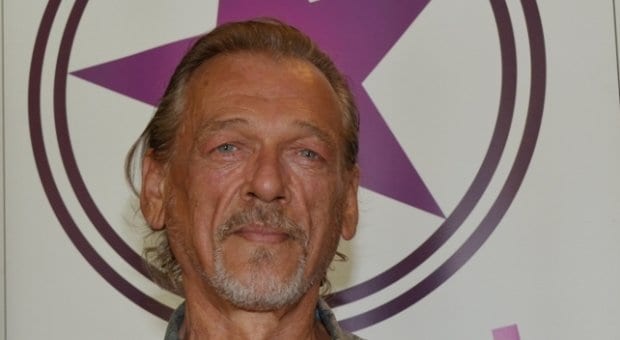

 Why you can trust Xtra
Why you can trust Xtra


